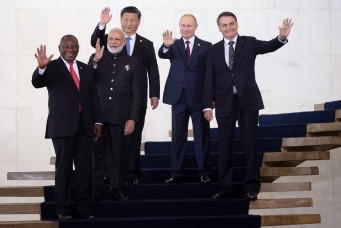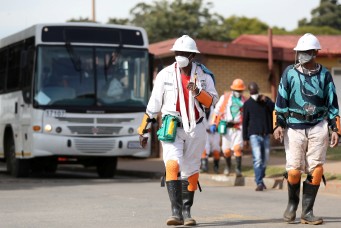Shaping Africa’s New Normal
In the wake of the COVID-19 pandemic, African nations are working through the Aswan Forum for Sustainable Peace and Development to set the continent back on track with its developmental Agenda 2063.

Since the onset of the COVID-19 pandemic, some African countries have recorded relatively low rates of infections and related deaths. With a population of over one billion, the continent has registered 4.5 million cases of the virus, amounting to 3.08 percent of global infections. The number of recorded deaths stands at roughly 120,000; compared with 1 million in Europe; 506,000 in Asia; and 1.6 million in the Americas, making the African case-fatality ratio (CFR) significantly lower than the global CFR.
This contrast can be attributed both to the international community’s lack of cooperation in the face of the global health crisis, and to the African Union’s prompt show of initiative and multilateral response.
Challenges to multilateral cooperation
For years now, a number of ongoing challenges have hindered multilateral cooperation in the international sphere. Chief among these apocalyptic threats to the international community, as outlined by UN Secretary-General Antonio Guterres, are growing geopolitical tensions among global powers, climate change, growing inequality within and among states; and the downsides of technological innovation, epitomized in automated weapons and warfare. The reverberations of these challenges were strongly felt in the wake of the COVID-19 crisis, when the lack of cohesion between different bodies of international governance led to a belated and arguably insufficient response.
Speaking at the 2021 Aswan Forum Strategic Dialogue, Former Egyptian Minister of Foreign Affairs and member of the African Union Panel of the Wise Amre Moussa denounced the United Nations’ inaction in the early stages of the pandemic, saying, “In the initial months, the United Nations seemed to be unable to act or to react”.
Indeed, while the World Health Organization (WHO) declared the COVID-19 outbreak a pandemic on March 11, 2020; it was not until July 1 that the UN Security Council took action in the form of UNSC resolution 2532, calling for a global ceasefire to direct attention to combatting the deadly virus. By then, the global number of confirmed cases had reached 10.3 million, and projections for global economic growth had fallen 6.5 percentage points below the pre-covid projections of January 2020.
Brazilian ambassador to Egypt Antonio Patriota also touched upon these issues at the Strategic Dialogue. Echoing Moussa’s remarks, he denounced the global trend towards isolationism and called for a stronger and more inclusive multilateralism, saying “I believe that no country, no region, can single-handedly deal with the dimension of the public health and economic crisis we are facing; that in itself is an incentive for a renewed, reinvigorated multilateralism, or networked multilateralism”.
Yet, as he soundly noted, the UN Security Council may not be the institution best equipped to deal with the present crisis. The UNSC is charged with authorizing peacekeeping operations; but more prominently serves as the primary body for authorizing coercive action in the form of sanctions or military intervention -neither of which are of use in the face of a global pandemic. As such, the international community may look to other bodies of governance to take the lead in shaping the path towards recovery.
African leadership
While international mechanisms may have fallen short of expectations, since the onset of the pandemic, African states at large have demonstrated exceptional crisis-management ability and regional cooperation. The African Union was among the first regional organizations to take action in the advent of the novel coronavirus. As early as February 24, 2020, representatives of member states met in Addis Ababa to devise a continent-wide strategy to curb the spread of infections and recover African economies from the virus’ ramifications.
This exceptional show of initiative and leadership reflects Africa’s growing role on the global stage. Since the United Nations’ inception, African states have largely been relegated to the margins of the international system: there are no permanent African members in the UNSC composition, and the continent has historically stood on the fringes of global financial institutions. That said, the tide has slowly begun to shift in Africa’s favor, with African citizens increasingly taking on leadership positions within these institutions; these include but are not limited to the World Trade Organization, the International Finance Corporation, and the UN Office on Drugs and Crime.
Most recently, under the leadership of the Ethiopian Dr. Tedros Adhanom, the World Health Organization has worked to provide more equitable vaccine distribution to the world’s less affluent regions through the COVID-19 Vaccines Global Access Facility (COVAX). In Moussa’s view, these efforts could be further strengthened by the establishment of an African Health Organization, “not as a challenge to, or separate from the World Health Organization, but in cooperation with that organization and with other bodies of the African Union.”
What these various successes have shown is that, in Patriota’s words, there can be a future “where Africa will not be resigned to a diminished role in shaping a reinvigorated, more networked and hopefully more efficient multilateralism.”
Paving the way forward
Strong initiatives and multilateral cooperation have served to spare African nations from the staggering rates of COVID-19 infections and related deaths witnessed in other parts of the world. Nonetheless, the virus has deeply exacerbated pre-existing socio economic challenges and hindered ongoing peacekeeping and development efforts across the continent. Travel restrictions have placed significant strain on global supply chains and the tourism sector, launching the Sub-Saharan region into its first recession in over twenty-five years. Meanwhile, North African countries have been especially hard-hit by fluctuations in oil prices, according to the Cairo International Center for Conflict Resolution, Peacekeeping and Peacebuilding (CCCPA).
Rebuilding African economies and setting the continent back on its developmental track, in line with the African Union’s Agenda 2063, will be no easy feat. But as the various panels of the Aswan Forum for Sustainable Peace and Development have demonstrated, there are concrete steps to be taken towards a more united and equitable African future.
First among these steps is granting African bodies of governance greater emphasis in international decision-making processes. Over the past decade, the AU Peace and Security Council and its sub-regional organizations have made important strides in conflict prevention, management, resolution and post-conflict reconstruction across the continent.
Building on these achievements, Moussa suggested greater and more even-handed cooperation between the UN Security council and its African counterpart, saying, “we need to elevate the AU Peace and Security Council into a truly relevant council; one not only focused on African affairs but on international affairs.”
A second issue of pivotal importance in the African and international spheres is climate change, which has only recently come to be recognized as a leading environmental and humanitarian issue. Across the African continent, global warming has been among the lead causes of water scarcity, food insecurity, and lack of access to sanitation; and has had devastating socio-economic and health impacts on marginalized communities. In light of these growing challenges, the Aswan Forum dedicated a panel to the subject of Climate, Security, and Development; with a focus on how policymakers can more effectively assess and respond to climate-security risks.
A key step forward, noted Moussa, is devising a continent-wide response to the challenges wrought by global warming. “As I suggested an African Health Organization, I do suggest that we have to meet in a Pan-African conference on the issue of climate change,” he proposed.
A third developmental objective which figures at the forefront of the Agenda 2063 is the empowerment of women. Across the African continent, a number of national and international mechanisms have been established in recent years to promote gender-inclusive policy. A notable example would be the Network of African Women in Conflict Prevention and Mediation, or FemWise-Africa, which is a subsidiary of the AU Panel of the Wise, established in 2017 to strengthen the role of women in conflict prevention and resolution.
This year’s edition of the Aswan Forum brought light to the disproportionate impact of the pandemic on African women living in conflict zones. In light of the twentieth anniversary of UNSC Resolution 1325 on Women, Peace and Security, one panel invited policy makers and civil society representatives to reflect on persisting challenges to the resolution’s implementation, and what national leaders can do to devise gender-inclusive policy in both conflict and post-conflict settings.
A fourth pillar of the Agenda 2063 is strengthening Africa’s engagement with the rest of the world and positioning the continent as a dominant player in the global arena. This objective figures at the forefront of the Aswan Forum Strategic Dialogue, during which Patriota applauded Egypt’s Chairmanship of the UN Peacebuilding Commission, noting that “[the commission] already tries to implement something that the Aswan Forum has been highlighting: the continuum between peace and development and the emphasis on prevention.”
Patriota further spoke of the historical and ever-growing ties between Brazil and the African continent as a notable example of Africa’s engagement in the multilateral system. “Brazil feels very close to Africa for historic reasons. It is the country with the largest diaspora of Africans in the world and the Latin American country with the largest number of embassies in Africa,” he said, adding that “there is a scope for Brazil to engage more actively, bilaterally, with the African Union and through African institutions.”
The Mercosur Free Trade Area’s free trade agreement with Egypt, he noted, is a testament to the strength of diplomatic relations between the two regions, and could serve as a blueprint for closer ties between Latin America and the newly enforced Continental Free Trade Area in Africa (CFTA).
In Moussa’s view, one way to enhance Africa’s vocal participation in the multilateral system is to hold more intranational dialogues like those allowed by the Aswan Forum. “I hope that we should not have to wait for the same month next year to see the activities of the Aswan Forum,” he said. To this end, he suggested a monthly meeting of experts and diplomats to discuss policy solutions and strategies to deal with the ever-changing dynamics of African and global geopolitics.
Patriota reinforced this point, before restating the importance of multilateral cooperation in an increasingly complex international system.
“One vision for the future that we could have is a multiple world that is post-hegemonic, where we cooperate internationally, across regions to enhance the frameworks that we have for improving the lives of our societies; without falling into big power tensions or rivalries for hegemonic control of resources, nations, or the future of different parts of the world. This is my final thought: a post-hegemonic, multipolar world of enhanced cooperation,” he concluded.
Amina Abdel-Halim is associate editor at the Cairo Review of Global Affairs. Her work has appeared in Ahram Online, Al Ahram Weekly, the Cairo Review of Global Affairs, and the Cairo International Film Festival’s Daily Bulletin.
Read More



